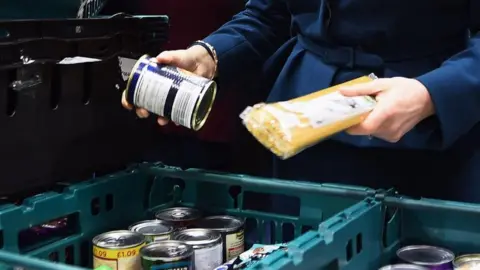The ongoing discourse surrounding the UK government’s two-child benefit cap has gained traction once again, as Graham Lucas, the manager of Worcester Foodbank, passionately voiced his concerns over its impact on families struggling with food poverty. In recent comments, Lucas articulated the pressing need for re-evaluation of this policy, emphasizing that it exacerbates an already critical situation for many families in the Worcester area.
Lucas’s statements come in the wake of a letter sent by a coalition of 11 charities, including the national food bank charity Trussell Trust, to Chancellor Rachel Reeves. This letter urges the government to abolish the controversial two-child limit in child benefit payments during next week’s spending review. According to statistics presented in the letter, the cap has led to a troubling increase in child poverty, pushing approximately 37,000 children into hardship since the current government took office.
Highlighting the profound difficulties facing families, Lucas asserted that “an awful lot of families just haven’t got sufficient money” to cover even basic household costs. His remarks resonate with many as they illustrate the harsh realities of financial struggle faced by numerous households in Worcester and beyond. The situation is compounded by the Department of Work and Pensions’ (DWP) anticipated announcement regarding the cap, which is expected this coming autumn. The DWP has publicly stated its commitment to reducing child poverty, yet the effectiveness and sincerity of such promises remain in question given the current struggles on the ground.
In further comments, Lucas condemned the two-child benefit cap, asserting that it is both unfair and detrimental to families. “The cap was not the right thing to be doing,” he pointedly remarked, outlining how it contributes to increased poverty levels, particularly food poverty, in local communities. He noted, “We see it at ground level,” indicating that, on a practical level, the cap affects the well-being of many families who find themselves unable to meet even basic nutritional needs. Indeed, he emphasized that roughly 40% of the individuals relying on food provided by the Worcester Foodbank are children, highlighting the severity of the issue.
Lucas also pointed out that rapidly escalating food prices, compounded by the broader cost-of-living crisis, have driven even more individuals to seek assistance from foodbanks. The correlation between rising living costs and increased demand for food assistance paints a stark picture of economic distress that countless families across the UK are currently navigating.
The situation has captured the attention of several media outlets, including the BBC, which has sought responses from the DWP regarding Lucas’s criticism of the policy. However, the expected announcement on the matter in the autumn is likely to shape the contours of this ongoing debate. The implications of the two-child benefit cap remain a divisive topic, further complicated by the economic landscape shaped by inflation and other financial pressures facing the populace.
As public discourse continues to unfold, the voices of those on the front lines, like that of Graham Lucas, are crucial in advocating for change that could alleviate the suffering of vulnerable families. His call for action is reflective of a growing consensus that the two-child benefit cap needs reevaluation or repeal to foster a more equitable social safety net for families across the UK. Keeping abreast of the developments in this situation is essential for understanding the evolving dynamics of poverty and social welfare in contemporary society.
In conclusion, the discourse surrounding the two-child benefit cap emphasizes a pressing need for discussions on social welfare reform that genuinely address the needs and challenges of vulnerable families. The testimonies from frontline workers such as Graham Lucas are vital to ensuring that policymakers recognize the human aspect of their decisions, which ultimately impacts the wellbeing of children and families across the nation. The continued efforts of charities and community organizations play a pivotal role in highlighting these issues, and the approach taken by the government in the coming months will be critical in determining the future trajectory of child poverty in the UK.



